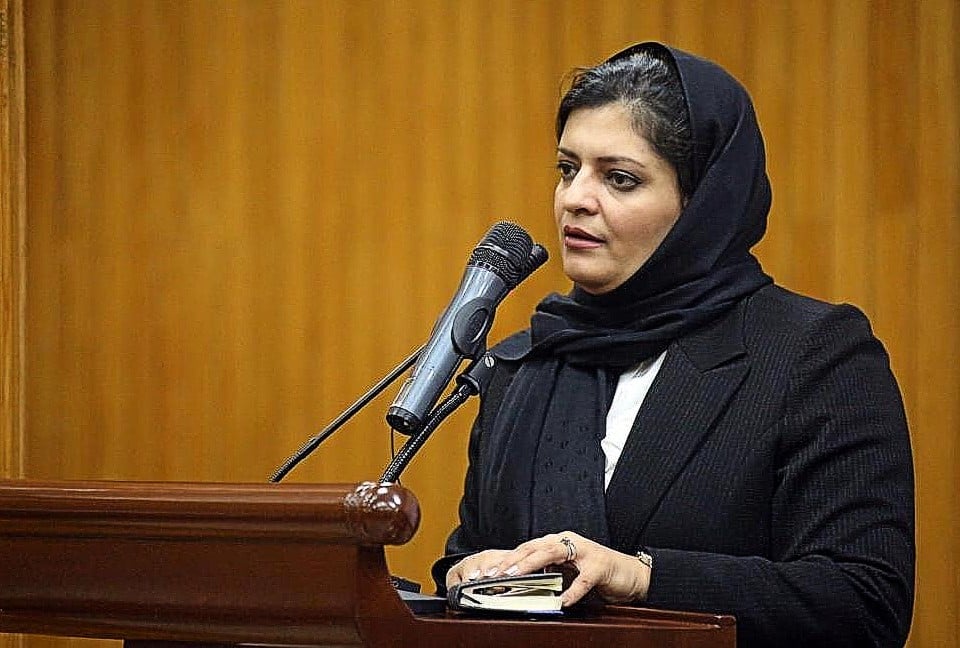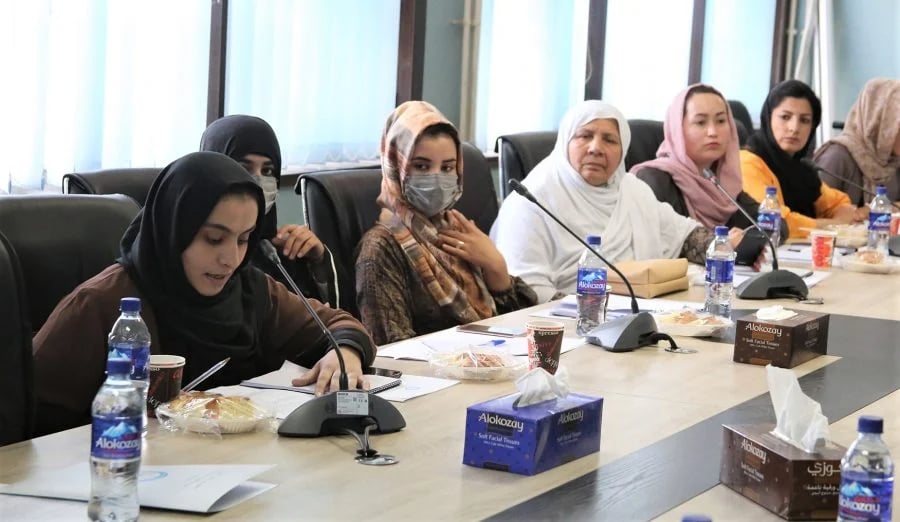So far, the historic peace talks between the Afghan Government and the Taliban in Doha are essentially a men’s affair. Yet women’s rights and women’s achievements of the past two decades, are at stake. “The real work is not in Doha. Doha is the gate to end a brutal war. But peace is not the absence of war,” says prominent activist Zarqa Yaftali.

Ms. Yaftali is one of the trailblazing women’s rights defenders Cordaid works with to enhance an inclusive peace process. She won the 2019 UNDP N-Peace Award. In August this year, President Ashraf Ghani appointed her to Afghanistan’s newly established High Council for National Reconciliation to facilitate intra-Afghan peace talks. She is one of only eight women and very few civil society activists in that council.
“The violations and the violence are carved in our memory and in our being. They have pushed us to move forward.”
Ms. Yaftali looks beyond the talks in Doha and the agendas of male leaders who are in the spotlights. Doha is important, she thinks, but it is not the place where true peace will be forged.
“Every Afghan woman remembers the days of the Taliban regime, from 1996 to 2001”, says Ms. Yaftali. “We were locked inside our homes, with no access to work, to education, to a doctor. We couldn’t move without a mahram [a male escort]. There was no justice. The violations and the violence are carved in our memory and in our being. They have pushed us to move forward. Today, despite the ongoing war, Afghan women are shaping this country, in government, in parliament, in embassies, in universities. Girls go to school. We still have a long way to go. But we have raised our voices, in all parts of the country, and we have come a long way.”
After the US-Taliban cease-fire talks in February, also in Doha, the Afghan government and the Taliban are now negotiating peace and a Taliban return to power in Kabul. How are Afghan women trying to get a seat at the table?
“Even at this moment, we are trying to get visas to set up side events in Doha, and to raise our points. In the first Doha talks in February, neither US Special Envoy Khalilzad nor the Taliban paid any attention to women’s rights and women’s participation. After we, women’s rights defenders in Afghanistan, spoke out, finally, in the last event, 10 women participated in the talks and put these issues on the agenda.
What we do is making a difference, we are changing policy- and decision-making processes. At the opening of the intra-Afghan talks in Doha on September 12th, Khalilzad and representatives of several countries raised the issue of women’s rights in the opening speeches. No one in Doha can beat around the bush any longer when it comes to women’s rights and gender equality. This illustrates the power of today’s generation of Afghan women.
“The media could play a more important role in safeguarding this progress. By not only focusing on conflict and armed groups but also on civic and civil dynamics in Afghanistan.”
Hopefully, we will be able to take part in the current round of talks. Our presence there is needed. Meanwhile, we have to look beyond Doha. My guess is that no true decisions will be taken in this first round of talks between the Taliban and the Government. That will happen in follow-up talks in Kabul.”
Do you fear a return of the Taliban as a governance power?
“Of course. As I said, we remember their regime. We remember being imprisoned inside our homes. We remember the suicide attacks and the loss of loved ones. This has never stopped. But there is also hope. Afghanistan has moved forward in the past two decades, despite the war. Women moved forward. The new generation is much more educated and open-minded. We cannot squander the progress we made.
The media could play a more important role as well in safeguarding this progress. By not only focusing on conflict and armed groups but also on civic and civil dynamics in Afghanistan. The progress we made in terms of women’s participation, education, health care hardly ever catches the news. We need a truer picture of Afghanistan.

We all want the war to stop. No more loss of family members and loved ones. 40 years of war – it started in 1979 – means that most Afghans have never known peace. We now have a unique opportunity in Doha, the first-ever talks between the Taliban and the Government, to achieve a political peace agreement. We have to grab it. I and a lot of others in the Afghan women’s movement are ready to forgive the Taliban. It is our painful sacrifice for peace. We accept them as part of the political power. But a political peace will only be the first step. The real work only starts after that.”
What do you mean?
“The real task ahead is to forge social peace. To bridge the divides between the younger generations and the conservative and older generations; between conservative Islamic narratives and values and values of tolerance, equality, and human rights. Between the educated young women and men in the bigger cities, and the uneducated and isolated communities in rural areas. Seeing young women participating in public life, engaging in political, economic, social, and cultural activities, will shock any older Talib man who enters Kabul today. These are clashing worlds. The true work of peace is to bridge these worlds. To educate people, to find common ground and understanding.
“Any form of aid or trade with a post-peace Taliban-included government should verifiably contribute to the advancement of Afghan women.”
The real work is not in Doha. Doha is the gate to end a brutal war. But peace is not the absence of war. Peace is creating the conditions that war will not return and that justice prevails. An important part of justice is that the basic rights and freedoms of women and young people are not only enshrined in our constitution but also enshrined in our society. Afghan women have been at the forefront of this peaceful battle for social peace and justice, in all parts of the country. This is why we claim seats at the highest levels when decision-makers negotiate political peace agreements. Denying us these seats is like ignoring more than half of Afghanistan’s population.”
What needs to be done to safeguard the rights of women and the progress they fought for once the Taliban have negotiated a return to the political arena?
“Our determination does not mean we don’t need international support. We do. And words are not enough. Foreign powers invest billions in Afghanistan every year. Women’s rights, the protection of women, and of women’s rights defenders need to become preconditions for this bilateral and multilateral financial support. Any form of aid or trade with a post-peace Taliban-included government should verifiably contribute to the advancement of Afghan women.
At the moment the government has no proper policies, strategies, or mechanisms in place to protect women and women’s rights defenders. With the Taliban negotiating their return, the protection and security of women have become an even higher priority than it already was. It needs to be legislated, regulated, financed, and implemented. Carefully and quickly.
“We don’t want women, yet again, to be sacrificed in the struggle for justice.”
Lastly, we need more trust. Solidarity is our greatest asset. We protect ourselves, we rise above ourselves, we strengthen one another. And donors around the world support us. Unfortunately, donors often opt for short-term project support. But our lives and visions last longer than projects. What we need most is the trust of long-term collaborations. It allows us to grow and to grow stronger.”
If you look two years ahead, what is your biggest concern?
“That peace will come without justice. That after the signing sessions in Doha, highlighted in news outlets around the globe, no true efforts will be made to promote social peace. Justice and social peace need to be embraced and achieved by all negotiating parties. Afghan women have sacrificed a lot to move forward. We don’t want women, yet again, to be sacrificed in the struggle for justice.
But this concern is not overshadowing my vision of hope. If the war ends and women continue on their way forward, Afghanistan could finally recover. Who knows, Afghans could taste peace again. Real peace.”
Cordaid’s support for an inclusive peace process
Cordaid actively supports women from a wide variety of backgrounds to be part of an inclusive peace process. With various women’s rights organizations, Cordaid works on strategy building, capacity strengthening, information sharing, and continuous lobby and advocacy. We work with relevant actors in the peace processes at the local, national, and international levels.
Women and girls in Afghanistan are constantly seeking ways to move forward, to prosper, to shape their own and their country’s future. And to work on sustainable peace. Cordaid’s aim is to support them.
Read more about inclusive peace and women’s participation in the Afghan peace process in the following articles:
Women need to gain ownership of the Afghan peace process
Afghan women claim a seat at US-Taliban talks
Interview by Frank van Lierde, corporate journalist at Cordaid